It was not the earlier attempts from the anti-independence opposition - the PSC, Vox, Cs and the PP - that prevented the CUP party's resolution, on the holding of a new Catalan self-determination referendum during this legislature, from being defeated at today's parliamentary session. Instead, the proposal fell down due to the division within the three pro-independence parties which scuttled the idea. The CUP, ERC and Junts share goals but not methods, and their division today prevented Parliament from approving a date for the holding of a new referendum, just on the eve of the fourth anniversary of the vote of 1st October 2017.
On the third day of the Catalan Parliament's general political debate, CUP deputy Dolors Sabater defended that setting a deadline for a new referendum would create a "lever to reactivate the independence movement", and she pointed out that it is a proposal for "generating tension," as she sees it impossible to exercise self-determination by trying to make a pact with the Spanish state.
Junts, PSC, Vox, Cs, the PP and the Comuns all voted against the proposal. In fact, Vox and Cs even announced that they will use the fact that a majority on Parliament's Bureau accepted giving a hearing to the proposal as a reason to take it to the Constitutional Court for allegedly violating Spain's Magna Carta.
The two pro-independence government partners went their own ways. The CUP voted in favour, ERC abstained and Junts against. The meeting that the left-wing party forced this morning to try to reach an agreement on the initiative failed, as they were unable to unblock the disagreement. The CUP had proposed including the proposal to hold a referendum before the end of the legislature in the joint resolution proposal by ERC and Junts on amnesty and self-determination.
Sources close to that negotiation explained that the CUP and ERC reached very close positions during the meeting, but the main disagreement between them was in the timing for a vote: ERC agreed to prepare it this legislature, but wanted to hold it later. Carles Puigdemont's party, on the other hand, had no intention of negotiating with the anti-capitalists on a proposal which, according to Junts MP Francesc de Dalmases, is a "stupid and useless gesture".
An agreed referendum, without a date
Despite the division over the decision on whether or not to hold a referendum, the CUP avoided giving an impression of having weakened the independence forces, voting in favour of the proposals submitted by ERC and Junts on the amnesty and self-determination as well as the "52% resolution".
This last-named resolution, "We are 52%", based on the pro-independence majority in the popular vote in February's election, is an initiative of Junts and reaffirms that only a referendum agreed with the state can replace the mandate of 1st October. It calls to create "a committee in Parliament with the aim of monitoring, accountability and appearances by experts on the negotiation process" with the state. The resolution urges the government to "continue to work hard to be able to mount a new democratic combat that will allow the Catalan Republic to be achieved".
But even this proposal did not put a stop to disagreements. ERC spokesperson Marta Vilalta addressed Junts during her speech to ask how they want to achieve an agreed referendum "without negotiation" at a dialogue table. Junts spokesperson Mònica Sales was highly critical of the Spanish state and the dialogue process, commenting that the meeting agenda presented by Pedro Sánchez's executive at the table is "magical unionism". In the face of the referendum proposed by the CUP, Sales said that it would only make sense to erase the legitimacy of October 1st if it were through the holding of an agreed referendum.
In the main image, ERC and Junts members during the vote in the chamber / Joan Mateu Parra (Europa Press)

